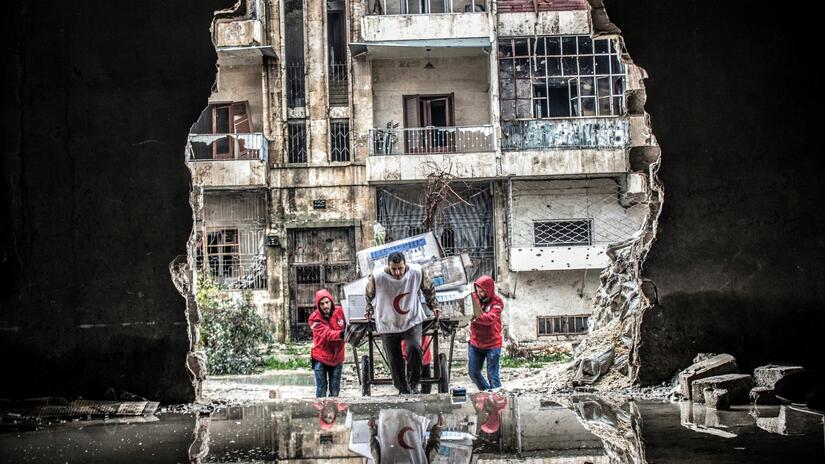Geneva, 4 March 2021 – The daily suffering of Syrians is worse now than it has been at nearly any point throughout the decade-long conflict that has ravaged the country. This is the sobering message delivered today by three senior Red Cross and Red Crescent officials as Syria enters the second decade of a relentless crisis.
Khaled Hboubati, the President of the Syrian Arab Red Crescent, said:
“Continuing hostilities, a downward economic spiral, a refugee crisis that has reverberated around the world and the COVID-19 pandemic have conspired to push Syrian people to unacceptable extremes. For a decade now, people in Syria have been living in agony. As we speak, more than 13 million people need at least one type of assistance and about 8 million people are unable to respond to their basic needs.”
With the price of basic commodities more than doubling in the last year alone, food insecurity has worsened for the Syrian people. Around 12.4 million people - 60 per cent of the Syrian population - do not have regular access to enough safe and nutritious food, and more than 90 per cent of the population is estimated to live under the poverty line.
Speaking ahead of his visit to Syria, Peter Maurer, President of the International Committee of the Red Cross (ICRC), said:
“The people of Syria cannot afford to endure another year like this, let alone another ten. We need a political solution to end the conflict, ongoing financial support for the recovery - and a future for those who have lost so much.”
The immense humanitarian needs across Syria have been exacerbated by the COVID-19 pandemic, said Francesco Rocca, President of the International Federation of Red Cross and Red Crescent Societies (IFRC):
“For most Syrians, worrying about the virus is a luxury they cannot afford. They cannot afford to protect themselves. They cannot isolate themselves at home or else no food would be on the table. And even if they do get contaminated by the virus, the health system has been battered so severely that access to treatment and care is limited.”
The Syrian Arab Red Crescent have been responding to the needs of people in Syria since the first days of the conflict. With the support of the ICRC and the IFRC, backed by dozens of National Red Cross and Red Crescent Societies around the world, Red Crescent volunteers are delivering more than 60 per cent of aid across Syria. Without them, this humanitarian catastrophe would have been much worse. Since the beginning of the conflict, 65 volunteers of the Syrian Arab Red Crescent and eight volunteers of the Palestine Red Crescent branch in Syria have lost their lives in the line of duty.
“We ask that States and all parties to the conflict respect and ensure international humanitarian law is respected in their operations,” added ICRC’s Maurer. “Humanitarian access, the protection of civilians, and humane treatment of detainees are not in the category of ‘nice to have’, they are both a moral and legal obligation.”
In the neighbouring countries of Egypt, Iraq, Jordan, Lebanon and Turkey, where an estimated 5.3 million Syrians have found refuge, the International Red Cross and Red Crescent Movement also plays an essential role in supporting vulnerable refugees and local communities.
IFRC’s Rocca said:
“Now, more than ever, Syrians need our solidarity and support. Over the past decade there has been tremendous generosity and solidarity. Unfortunately, today, we see that donations are declining despite the worsening humanitarian situation. We have a moral duty to support the sustainability of the Syrian Arab Red Crescent, an organization that is so integral to the delivery of the international community’s support. Without the Syrian Arab Red Crescent, millions more would go hungry every month.”
Press release
IFRC welcomes first aid into Gaza but says much more is needed
IFRC welcomes first aid into Gaza but says much more is needed
| Press release

